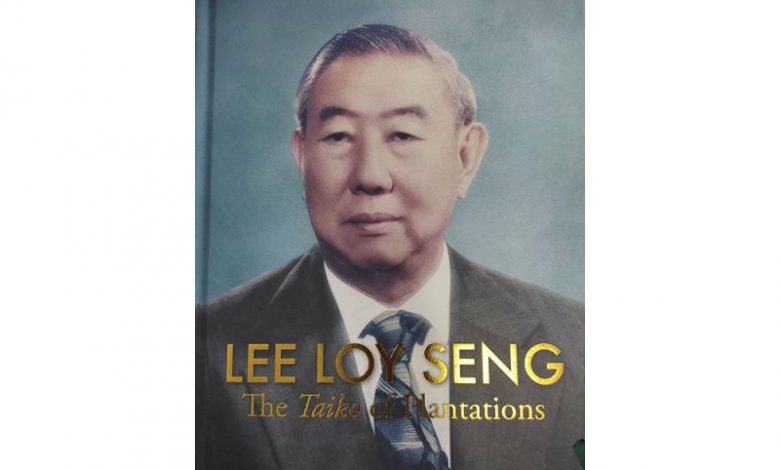

By Koh Yung Chien Corey
When I first encountered this book, I must admit that I was not familiar with Tan Sri Lee Loy Seng’s name, nor did I know of KLK beyond its name.
A portrait of Tan Sri Lee adorns the hardcover of the book, giving the reader a glimpse into the character of the man whose extraordinary achievements are charted within these pages.
Well-groomed, with neatly cropped silver hair and a dark suit, it would be easy to see Tan Sri Lee as a strict, unyielding business leader – and rightly so. But his wry smile, stern yet compassionate, and gentle gaze belies the philanthropist and community-oriented man within.
Indeed, this people-first approach to business, touching lives and doing so much good in the community along the way, was what struck me most about Tan Sri Lee’s life. His illustrious exploits in the business world are undoubtedly impressive, but his values, and the way in which he became a pillar of his community, are my biggest takeaway as a reader.
Tan Sri Lee did not have the easiest start to life.
The Japanese occupation, perhaps some of the harshest times in Malayan history, robbed him of his teenage years and delayed his education, while decimating his family assets. Further sacrifices were demanded of him when he had to give up his personal dreams of studying medicine to manage his family’s affairs.
With hindsight, it was undoubtedly a blessing in disguise. However, this also imbued in him the importance of honesty, sincerity, hard work, and taking care of one’s community, values which would guide him throughout his life.
Raised in a large family, his leadership was evident from a young age, where he “learnt the importance of maintaining good relations among people with different characteristics”. No doubt, these were the seeds of his people-oriented approach to business later in life.
This book is peppered with anecdotes of Tan Sri Lee’s compassion – employee welfare was a critical part of his business strategy and KLK invested heavily in infrastructure on plantations for his employees. Scholarships were awarded to deserving children of employees. Tan Sri Lee’s generosity extended far beyond the purview of most companies, and all he asked for in return was loyalty.
In today’s world, such values are increasingly rare, certainly not to his extent, and even then, sceptics may say that they are not born out of genuine care for these employees. Regardless, employees of KLK – and indeed their descendants—have truly benefited from his generosity.
In a sense, his formula is not complicated. Quite simply, a happy workforce, with a genuine sense of belonging and loyalty to the company that extends beyond mere remuneration, will be a productive workforce.
But it is the simple things, done well, that give the best results. I have no doubt that Tan Sri Lee’s approach was born out of his love for his employees and his mastery of this idea.
Of particular interest to me was Tan Sri Lee’s forward-thinking and innovative spirit. He “respected and followed Chinese traditions, but only to a point.” In an ever-evolving world, dogged adherence to dogma is perhaps foolish. Tan Sri Lee recognized this, and gave his sons an English education instead of a Chinese one.
This spirit is also evident in his daring and astute business decisions; he recognized the potential of land as both a plantation asset and as property, providing the seeds of his business empire. He was a patriot, through and through, dedicating himself to Malayanisation in the early years of independence not just as a business decision, but a community one; he wanted to bring jobs back to Malaysia to improve the lives of his countrymen.
It’s incredibly admirable that amidst the millions of dollars swirling around, Tan Sri Lee did not lose sight of his roots. I recall the Mandarin saying “饮水思源” – one must always be grateful for one’s origins.
A quick google search of Tan Sri Lee’s name reveals the extent of his impact on the community: bearing his name are, among others, a Badminton complex in the heart of Ipoh, roads, schools, and scholarships. I think that making money is a skill that one can learn to an extent, but what one does with that money is the truest reflection of one’s character. In his own words, “If you do good, it will come back to you.” Doing good for its own sake is perhaps the most noble form of charity.
This book was quite the read. It’s a testament to the hard work of Tan Sri Dato’ Seri Lee Oi Hian that he was able to uncover and immortalise so much of his father’s legacy, leaving it behind for the younger generation to learn and benefit from.
I am not remotely a businessman, and so my biggest takeaways were about Tan Sri Lee’s character. No doubt, a student of business would be able to mine this book for its rich veins of wisdom and gain a very different perspective.
We would all do well to emulate even a fraction of Tan Sri Lee’s integrity, humility, discipline, generosity, and determination.
—
Singaporean, Koh Yung Chien Corey, whose father is from Ipoh, decided to pen this review as a tribute to his father’s heritage. A multi talented young man with many gifts, Corey is known in the Singapore classical music scene as a child prodigy singer who performed in esteemed venues such as Victoria Concert Hall, Tokyo’s Suntory Hall and even New York’s Carnegie Hall.
Having started vocal training at the age of 6, Corey is an aspiring tenor, who is also branching out into pop with the release of his debut single, Only Love.



So many of us in many parts the world or our ancestors were from Ipoh. It was so sad that many had left the town and only few returned to retire.
Where can I purchase a copy of the book “Lee Loy Seng: The Taiko of Plantations”?
I am interested about this book. Where can I find it.?
I’m also interested in buying this book
I’m a scholar under TSLLS Foundation too. May I know where could we purchase the book?